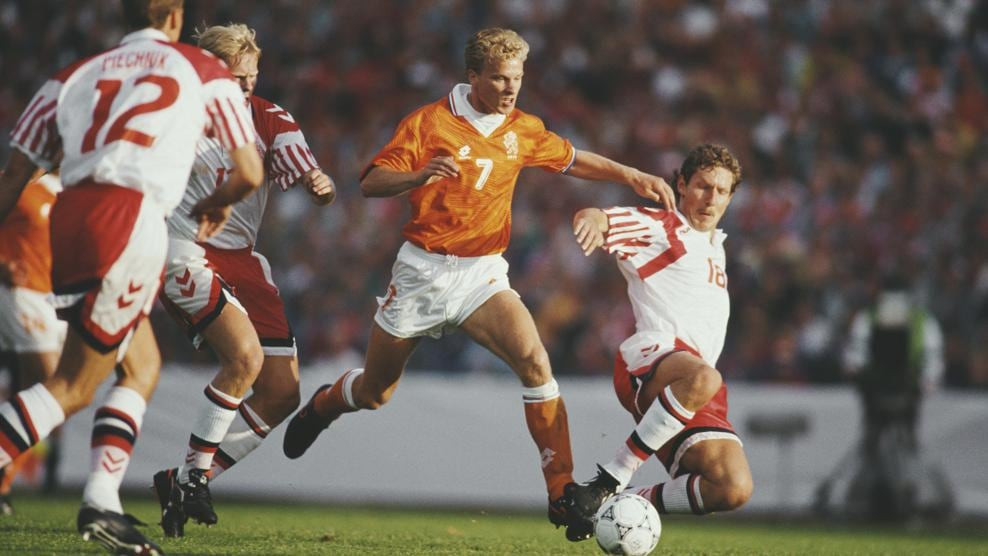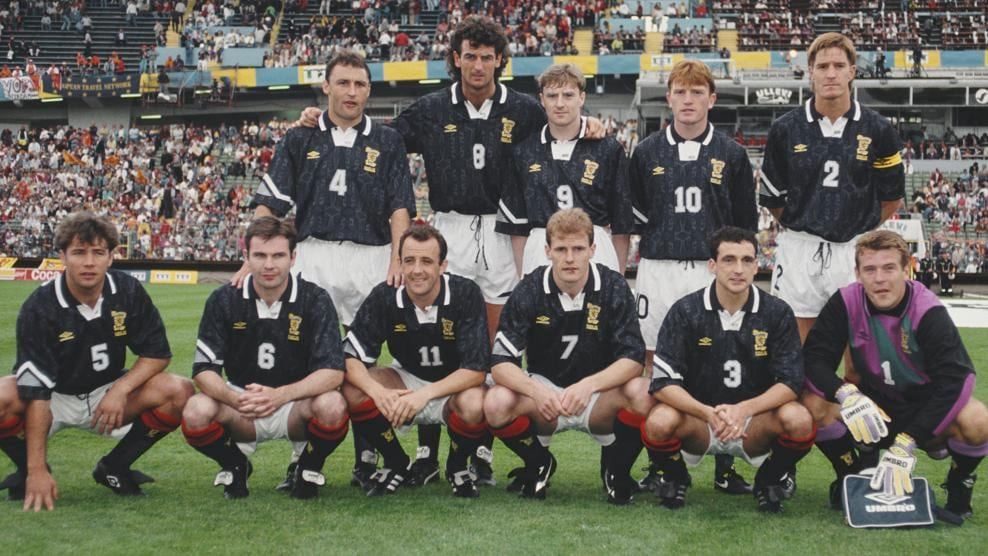The UEFA European Championship in 1992 is etched in football history as one of the most astonishing underdog stories ever told. Against all expectations, Denmark, a team that hadn’t even qualified for the tournament initially, emerged victorious, defeating Germany 2-0 in the final held on June 26, 1992. This improbable win at the Ullevi Stadium in Gothenburg remains a testament to the unpredictable magic of football.
Denmark’s Road to Glory: From Last-Minute Entry to European Champions
Denmark’s participation in Uefa Euro 1992 was itself a stroke of luck. They were late replacements for Yugoslavia, who were suspended due to the political turmoil in the country. Thrust into the spotlight at the eleventh hour, few gave the Danish team a chance. They were perceived as mere participants, not contenders.
Their journey through the group stage was far from smooth. However, defying predictions, they managed to scrape through to the knockout rounds. In the semi-finals, they faced the reigning European champions, the Netherlands, a team packed with stars. In a tense and closely fought match, Denmark showcased resilience and tactical discipline, ultimately overcoming the Dutch giants in a penalty shootout.
The final pitched them against the newly reunified Germany, the clear favorites and a powerhouse of European football. Germany dominated possession and created numerous chances, but Denmark’s defense, marshaled by goalkeeper Peter Schmeichel, stood firm. Against the run of play, John Jensen stunned Germany with a powerful strike to open the scoring. Later in the second half, Kim Vilfort added a second, sealing a historic 2-0 victory for Denmark.
Reflecting on the incredible achievement, Peter Schmeichel captured the magnitude of their win: “It really sank in when we were in Copenhagen in the town hall for the celebrations with the rest of Denmark. At this point you’re thinking: ‘Christ, we actually did this – it’s not a dream.'”
UEFA Euro 1992 Top Scorers: A Quartet of Talent
While Denmark’s collective effort was key to their success, individual brilliance also shone at UEFA Euro 1992. Four players shared the Golden Boot, each netting three goals throughout the tournament:
- Dennis Bergkamp (Netherlands)
- Tomas Brolin (Sweden)
- Henrik Larsen (Denmark)
- Karl-Heinz Riedle (Germany)
Interestingly, the top scorer in the qualifying rounds was Darko Pancev of Yugoslavia, with an impressive ten goals. Nicknamed ‘The Cobra’, Pancev was set to make a significant impact at the EURO, but Yugoslavia’s suspension tragically denied him the opportunity. He later played for North Macedonia and, after retiring, honored his playing days by opening a café named Devetka (Nine), after his jersey number.
 Dennis Bergkamp weaves through the Danes
Dennis Bergkamp weaves through the Danes
Sweden: Host Nation of UEFA Euro 1992
Sweden had the honor of hosting the UEFA Euro 1992 finals. The tournament, featuring eight teams, was staged across four stadiums, creating a vibrant atmosphere throughout the country. Gothenburg’s Ullevi Stadium was the centerpiece, hosting five matches including a semi-final and the final itself. Stockholm’s Råsunda Stadium also played a crucial role, staging four games, including another semi-final. Norrkoping’s Idrottsparken and Malmö Stadium in Malmo each hosted three group stage fixtures, ensuring the tournament’s reach across Sweden.
Richard Møller Nielsen: The Architect of Denmark’s Defensive Masterclass
Richard Møller Nielsen, the coach of Denmark, was not initially the popular choice for the job. Taking over in 1990, he emphasized defensive solidity, a strategy that wasn’t always appreciated by the more attack-minded players in the squad. However, his pragmatic approach proved to be the foundation of Denmark’s Euro 1992 triumph. ‘Ricardo’, as he was known, instilled discipline and organization in the team, making them incredibly difficult to break down. His tactical acumen and ability to make crucial decisions at key moments were instrumental in Denmark’s success. Midfielder John Jensen acknowledged Nielsen’s vital role: “It was a great honour to play under him. He made the right decisions at the right times.”
Lars Olsen: The Captain Leading Denmark to European Glory
Lars Olsen, the central defender and captain of Denmark, was the experienced leader who guided the team through the highs and lows of UEFA Euro 1992. Having previously represented Denmark at the 1988 EURO finals, Olsen brought invaluable experience and composure to the team. He arrived in Sweden fresh off winning the Turkish Cup with Trabzonspor, demonstrating his winning mentality. Olsen’s leadership on and off the pitch was crucial in fostering team spirit and belief, driving Denmark towards their historic victory.
UEFA Euro 1992 Format: A Classic Eight-Team Tournament
The UEFA Euro 1992, held from June 10–26, marked the ninth edition of the competition and the last to feature an eight-team final tournament. The format was straightforward: the eight participating teams were divided into two groups of four. The winners of each group faced the runners-up from the other group in the semi-finals. There was no third-place play-off, adding to the knockout intensity of the latter stages.
Participating Nations and the Road to UEFA Euro 1992
A total of eight teams competed in the UEFA Euro 1992 finals, while 34 nations participated in the qualifying stages. This edition marked the first-time participation for both the Faroe Islands and Liechtenstein, expanding the reach of European football. Sweden automatically qualified as hosts. The qualifying process was also marked by significant geopolitical events. German reunification led to East Germany’s withdrawal and West Germany competing as Germany. The dissolution of the Soviet Union resulted in the team that had qualified as the Soviet Union participating as the CIS (Confederation of Independent States), representing 12 post-Soviet republics. Yugoslavia’s suspension due to political reasons ultimately paved the way for Denmark’s unexpected entry and subsequent triumph.
UEFA Euro 1992: Team of the Tournament – Recognizing Excellence
The official UEFA Euro 1992 Team of the Tournament recognized the standout performers from across the competition. It featured a blend of seasoned veterans and emerging stars:
- GK: Peter Schmeichel (Denmark)
- DF: Jocelyn Angloma (France)
- DF: Laurent Blanc (France)
- DF: Andreas Brehme (Germany)
- DF: Jürgen Kohler (Germany)
- MF: Ruud Gullit (Netherlands)
- MF: Brian Laudrup (Denmark)
- MF: Stefan Effenberg (Germany)
- MF: Thomas Hässler (Germany)
- FW: Dennis Bergkamp (Netherlands)
- FW: Marco van Basten (Netherlands)
The First Goal of UEFA Euro 1992: A Swedish Start
Jan Eriksson, a Swedish defender, had the honor of scoring the first goal of UEFA Euro 1992. He headed home from an Anders Limpar cross in the 24th minute of Sweden’s opening match against France, which ended in a 1-1 draw. Eriksson went on to score again in the tournament, further cementing his contribution to the host nation’s campaign. Interestingly, the very first goal of the entire UEFA Euro 1992 qualifying campaign had been scored much earlier, by Arnór Gudjohnsen of Iceland in May 1990 against Albania. Arnór Gudjohnsen is also known as the father of Eidur Gudjohnsen, who later became a prominent striker for Chelsea.
Five Intriguing Facts About UEFA Euro 1992
UEFA Euro 1992 is full of fascinating anecdotes and historical context:
- Denmark’s victory occurred shortly after a Danish referendum where the nation voted against joining the European Union. Foreign minister Uffe Ellemann-Jensen famously quipped: “If you can’t join them, beat them.”
- Denmark’s triumph was especially remarkable given that professional football was a relatively recent development in the country. Professional clubs only emerged in Denmark in 1986, with Brøndby leading the way.
- Scotland, despite being a regular participant in World Cups since 1974, made their debut appearance at the UEFA European Championship finals in Sweden in 1992.
 Scotland made their first EURO finals appearance in 1992
Scotland made their first EURO finals appearance in 1992
- France achieved a perfect qualifying record for UEFA Euro 1992, winning all eight of their matches in a group that included Spain, a feat unmatched before in the competition’s history.
- UEFA Euro 1992 was the first major international tournament where players’ shirts featured their names in addition to their numbers, ranging from 1 to 20, a now-standard practice in football.
UEFA Euro 1992 remains a captivating chapter in football history, primarily remembered for Denmark’s improbable and inspiring victory. It serves as a reminder that in football, and in life, the underdog can always have their day.
